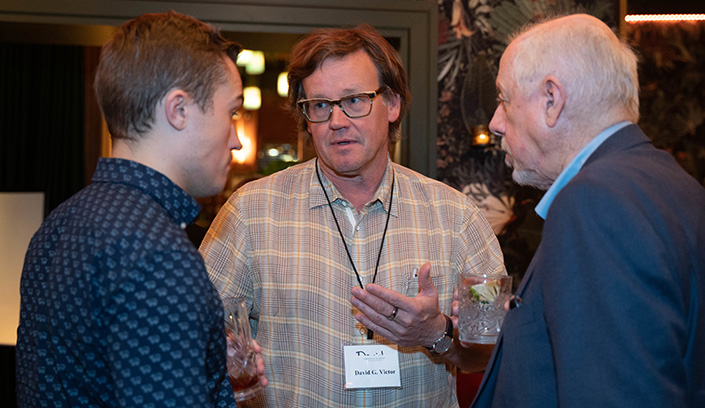New Report Calls for Cross-Sector Approach to Climate Action
Diverse commission of leaders from the University of California San Diego’s School of Global Policy and Strategy alongside other preeminent institutions developed the report, which launches Oct. 24
Published Date
Story by:
Media contact:
Share This:
Article Content
A new report led by the University of California San Diego’s David G. Victor and fellow experts from the Commission on Accelerating Climate Action at the American Academy of Arts & Sciences, calls for a robust and coordinated, cross-sector effort to combat climate change.
The report, Forging Climate Solutions: How to Accelerate Action Across America, launches Oct. 24 and provides five key strategies and 21 recommendations rooted in justice, pragmatism and accountability across diverse stakeholders. The report, which developed over the previous two years, recommends how corporations, frontline communities, government and environmental groups can work together to mobilize investments, build infrastructure, reduce emissions and prepare adaptation strategies for the impacts of climate change.
The report will launch with a hybrid event, accessible virtually or in person in Washington D.C. Laura Helmuth of Scientific American will moderate a panel conversation where the Commission’s four co-chairs: David G. Victor, Mustafa Santiago Ali of the National Wildlife Federation, Christopher Field of Stanford University, and Patricia Vincent-Collawn of PNM Resources—will discuss the report and a whole-of-society plan to combat the climate crisis.
“There’s no shortage of good ideas for U.S. climate policy. What’s been missing is a strategy that will build and sustain political consensus on action,” said Victor, co-director of the Deep Decarbonization Initiative and professor of Innovation and Public Policy at UC San Diego’s School of Global Policy and Strategy. “Our Commission shows how to design and implement a politically savvy climate strategy.” Victor added: “This Commission is diverse in many ways—including covering political ideology from the far left to the far right—which is why our consensus recommendations matter so much.”
With the goal of developing a shared understanding of the climate change issues facing people nationwide, Victor and his fellow co-chairs engaged a diverse group of leaders who recognized the urgency of the situation and the importance of developing an inclusive approach to accelerating climate action. The commission’s expertise spans the arts, faith communities, environmental justice, youth activism, the natural and social sciences, Indigenous people and Indigenous Knowledge, public health and urban design.
The Commission on Accelerating Climate Action is an extension of a statement issued by the Board of the Academy, attesting to the reality and urgency of climate change and committing the Academy to confront this existential threat. From the statement: “All of us—scientists, engineers, humanists, lawyers, social scientists, educators, artists and individuals from the private sector and government—must work together to limit and respond to climate change. In these efforts, we need to collaborate with national and international companies, organizations and institutions.”
Founded in 1780, the American Academy of Arts & Sciences is both a membership society that honors excellence and a nonpartisan research organization engaging leaders from across disciplines, professions and perspectives to work on pressing issues.
The Deep Decarbonization Initiative is a combined effort of faculty across UC San Diego working at the intersection of science, technology and policy. It is focused on helping the world cut emissions of warming gases given the very real technology, economic and political constraints that exist. The initiative was founded in partnership by UC San Diego’s Jacobs School of Engineering and School of Global Policy and Strategy. More information can be found at deepdecarbon.ucsd.edu.
Victor is a professor of Innovation and Public Policy at the School of Global Policy and Strategy and a professor of Climate and Atmospheric Science at the Scripps Institution of Oceanography. He is also an adjunct professor in the department of Mechanical and Aerospace Engineering.

Share This:
You May Also Like
Stay in the Know
Keep up with all the latest from UC San Diego. Subscribe to the newsletter today.




